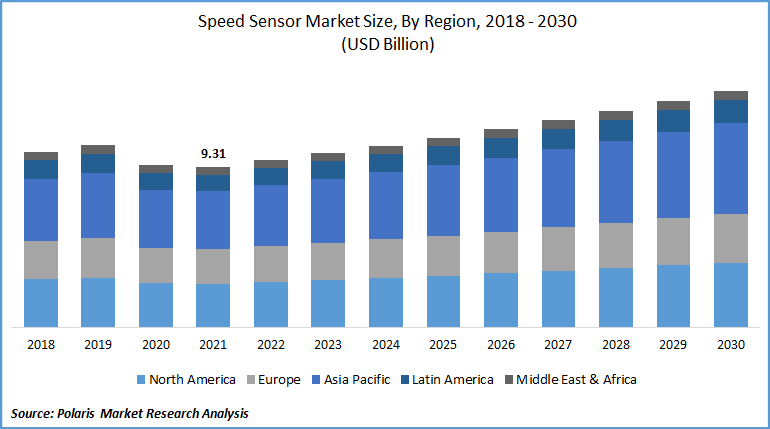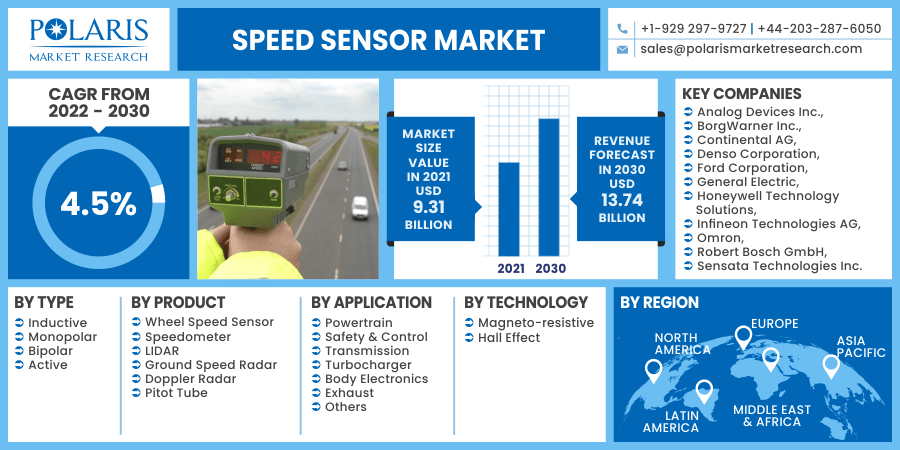
Speed Sensor Market Share, Size, Trends, Industry Analysis Report, By Type (Inductive Sensor, Monopolar, Bipolar, Active Sensor); By Product (Wheel Speed Sensor, Speedometer, LIDAR, Ground Speed Radar, Doppler Radar, Pitot Tube); By Application; By Technology; By Region; Segment Forecast, 2022 - 2030
- Published Date:Mar-2022
- Pages: 116
- Format: PDF
- Report ID: PM2324
- Base Year: 2021
- Historical Data: 2018 - 2020
Report Outlook
The global speed sensor market was valued at USD 9.31 billion in 2021 and is expected to grow at a CAGR of 4.5% during the forecast period. This is utilized for the measurement of the rotational speed of moving objects. They offer to wear free & contactless measurement of mechanical quantities including the angle of rotation and angular velocity of a rotating target such as vehicles, gear, shaft, and others.

Know more about this report: request for sample pages
The rapid growth of automotive, consumer electronics manufacturing, and other sectors are fueling the growth of the industry. Furthermore, the increasing penetration of UAVs (Unmanned Aerial vehicles) is anticipated to offer huge growth opportunities. According to FAA (Federal Aviation Administration), UAS (Unmanned aircraft systems) in the US accounted for over 1.1 million units as of March 2021. Out of these, commercial UAVs accounted for 372,157 units, and recreational drones accounted for 496,647 units.
The onset of the COVID-19 reflects the downfall of the industry growth owing to the unprecedented restrictions on movement along with the disruptions in personal and business activities. The halt in the production of components and devices coupled with the issues in obtaining raw materials is hindering the growth of the industry.
The disruption in the supply chain, lockdown measures, and limited consumer and corporate spending is anticipated to hamper the industry growth. The impact of the COVID-19 outbreak is far-reaching, having negative effects on communities, individuals, and societies globally. The negative impact of the COVID-19 outbreak on major industries such as automotive and others are anticipated to hinder the growth of the industry. However, the market is estimated to recover at a fast growth rate post-COVID-19.

Know more about this report: request for sample pages
Industry Dynamics
Growth Drivers
The increasing demand for better vehicle safety is anticipated to drive the growth of the industry globally. They enable the smooth functioning of vehicles, electronics machines, and others. Furthermore, the introduction of innovative products that incorporate better safety features & algorithmic performance by major industry players is anticipated to boost the growth of the industry. For instance, in June 2019, Allergo Microsystems, one of the leading manufacturers of IC (Integrated Circuits), introduced A19250 & A19350 wheel speed IC, featuring new GMR technology and also covers stringent direction protocols set by government bodies.
These GMR-based IC are offered in the compact single-in-line package along with an integrated EMC protection capacitor. These are designed for use in combination with magnet encoder rings in order to get direction information and to measure velocity. Furthermore, in November 2021, a team of researchers at LPU announced the development of IoT based smart safety system for school buses.
This system includes a speed sensor market to ensure the safety of children by measuring the speed, keeping track of the direction information of the wheel, and communicating this sensory data to the transmission unit. These developments in the industry are anticipated to boost market growth.
Report Segmentation
The market is primarily segmented on the basis of type, product, application, technology, and region.
|
By Type |
By Product |
By Application |
By Technology |
By Region |
|
|
|
|
|
Know more about this report: request for sample pages
Insight by Technology
The magneto-resistive segment is projected to garner the largest revenue share and is expected to lead the market in the forecasting years. Magneto-resistive used in speed sensor market utilizes the fact that due to an external magnetic field, there is a change in electrical resistance in the ferromagnetic think film alloy. They detect disturbances or changes in magnetic fields that are created/modified by events or objects. Magneto-resistive is used for the path & angle measurement, determination of magnetic fields, dynamic measurements in vehicles, determination of magnetic fields, and others. These applications are anticipated to drive the growth of the segment.
Furthermore, the benefits offered by magneto-resistive sensors are fueling the growth of the segment. They are robust, energy-efficient, suitable for extreme environments, compact in size, and offer extremely precise measurements. The sensors using magneto-resistive technology are generally used under extreme conditions as they offer precise measurements under difficult conditions. The Hall Effect segment is projected to witness the highest growth rate in the forecasting years. The sensors based on this technology are constructed for progressive measurement of rotational speed. They are generally used in automotive systems in order to sense position, speed, and distance.
These sensors are most notable used for ABS (Anti-lock Braking Systems) and internal combustion engines to assist with ignition timings. These applications of these sensors are anticipated to boost the growth of the segment. Furthermore, the benefit offered by these sensors is anticipated to drive the growth of the segment. The sensors based on this technology are highly reliable, have the ability to work in a wide range of temperatures, offer high-speed operation and pre-programmable electric angles & outputs. The major application includes automation equipment, handling equipment, process & packaging machines, marine, automobiles, and others.
Geographic Overview
North America accounted for the highest market shares in the global market in 2020. The primary factors driving the growth of the industry in North America include the rising adoption of the speed sensor market across the consumer electronics, automotive, and defense sectors. Furthermore, the increasing demand for autonomous vehicles across the US is anticipated to boost the growth of the market.
The rising adoption of innovative technologies such as AI, IoT, and data analytics, among others, is anticipated to present huge market growth opportunities. Moreover, the rapid developments of high accuracy & low power speed sensors are anticipated to fuel the market growth.
Moreover, the North American market is anticipated to exhibit progressive CAGR over the forecasting years. The fast growth of the segment can be attributed to the fast-growing automotive industry across emerging nations. Furthermore, the implementation of various stringent government regulations regarding the compulsory inclusion of ADAS systems in new vehicles is anticipated to drive the growth of the segment.
For instance, in September 2018, the Ministry of Road & Transport of India announced the mandatory inclusion of ESC (Electronic Stability Control) and AEB (Autonomous Emergency Braking) in new vehicles. Furthermore, the increasing consumer electronics manufacturing sector of emerging nations such as Japan, China, and India are anticipated to propel market growth.
Competitive Insight
Some of the major players operating in the global market include Analog Devices Inc., BorgWarner Inc., Continental AG, Denso Corporation, Ford Corporation, General Electric, Honeywell Technology Solutions, Infineon Technologies AG, Omron, Robert Bosch GmbH, and Sensata Technologies Inc.
Speed Sensor Market Report Scope
|
Report Attributes |
Details |
|
Market size value in 2021 |
USD 9.31 billion |
|
Revenue forecast in 2030 |
USD 13.74 billion |
|
CAGR |
4.5% from 2022 - 2030 |
|
Base year |
2021 |
|
Historical data |
2018 - 2020 |
|
Forecast period |
2022 - 2030 |
|
Quantitative units |
Revenue in USD million/billion and CAGR from 2022 to 2030 |
|
Segments covered |
By Type, By Product, By Application, By Technology, By Region |
|
Regional scope |
North America, Europe, Asia Pacific, Latin America, Middle East & Africa |
|
Key companies |
Analog Devices Inc., BorgWarner Inc., Continental AG, Denso Corporation, Ford Corporation, General Electric, Honeywell Technology Solutions, Infineon Technologies AG, Omron, Robert Bosch GmbH, and Sensata Technologies Inc. |
